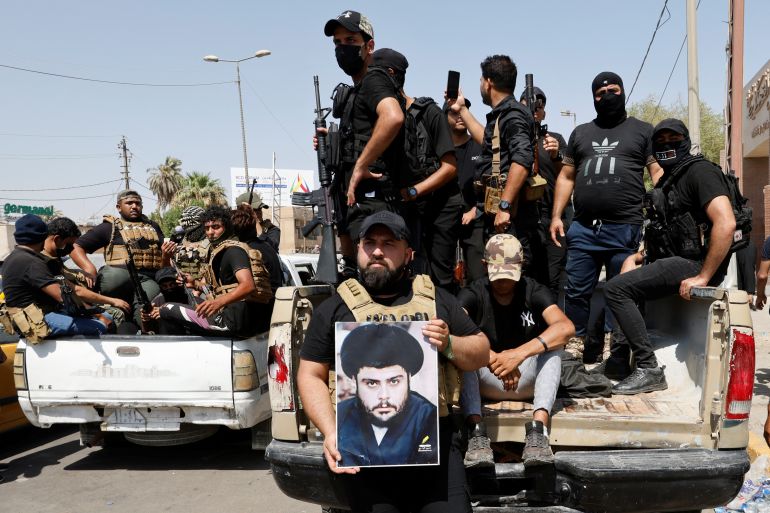Latest outbreak of violence in Iraqi city of Basra leaves 4 dead
Fighting earlier this week between rival Shia forces killed at least 30 people in Baghdad.

Four people were killed in overnight clashes between rival Shia Muslim fighters in the southern Iraqi city of Basra, local security officials have said, adding to the at least 30 people killed earlier this week in Baghdad.
Security officials said the clashes, which carried on into the early hours of Thursday, took place in the centre of Basra, Iraq’s main oil-producing hub.
Keep reading
list of 4 itemsSadr supporters still demand change in Iraq after deadly violence
Where does Iran stand on neighbouring Iraq’s political turmoil?
Iraq’s political dysfunction just got worse
“The gunfire exchange between the two sides has now resulted in the death of four people. Two of them belonging to Saraya al-Salam, which is the military wing of Muqtada al-Sadr and two belonging to the other side, Asaib Ahl al-Haq,” Al Jazeera’s Dorsa Jabbari said from Baghdad.
The armed clashes follow the latest round of Iraq’s ongoing political crisis after Shia religious leader Muqtada al-Sadr’s announcement of his “final withdrawal” from politics.
The fighting has raised fears of an escalation into a Shia-Shia civil war.
Jabbari added that a representative from al-Sadr’s movement had posted a warning online to Qais al-Khazali, the leader of Asaib Ahl al-Haq, to rein in his “disrespectful militias and mad dogs”.
“This is not the first time that there has been fighting between these two groups in Basra and in other regions in Iraq as well,” Jabbari said.
Asaib Ahl al-Haq had initially emerged as an offshoot of the Sadrist Movement in the years following the United States invasion of Iraq in 2003.
Earlier this week, Baghdad saw its worst violence in years, as armed supporters of al-Sadr fought with security forces and Iran-aligned gunmen, leaving more than 700 injured.
Analysts have said al-Sadr’s drastic steps appeared to have partly been in response to the resignation of Grand Ayatollah Kadhim al-Haeri on Sunday. Many of al-Sadr supporters follow al-Haeri, and the move was seen as an attempt to undermine al-Sadr.
An intractable political deadlock between al-Sadr and his rivals has left Iraq without a government since an October election, in which al-Sadr’s supporters emerged as the biggest party, but without a majority.
It has also deepened dysfunction and instability as Iraqis struggle to move on from decades of war, sanctions, civil strife and endemic corruption.